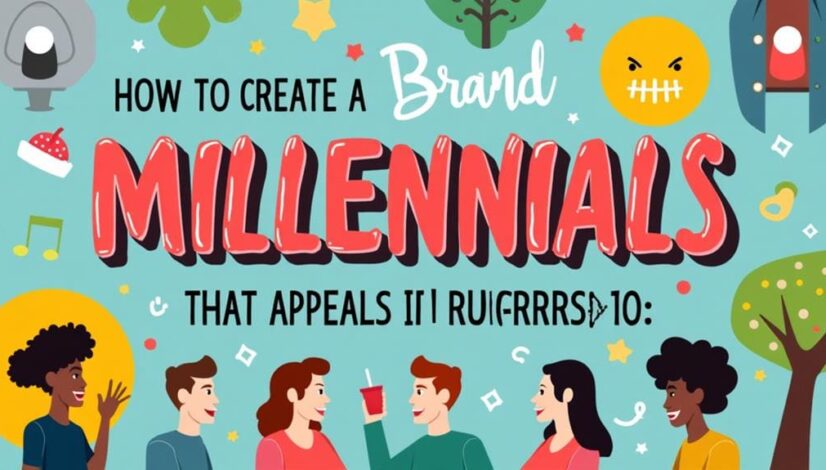How to Create a Brand That Appeals to Millennials
To create a brand that resonates with Millennials, prioritize authenticity and transparency in messaging. This generation values brands that demonstrate social consciousness and sustainability, so guarantee eco-friendly practices are integral to your business model. Effective storytelling is essential; share authentic narratives that foster emotional connections and relatability. Leverage social media with a genuine voice and engage actively, promoting community interaction. Personalization in marketing enhances loyalty, making each consumer feel valued. Additionally, memorable real-world experiences, such as live events, are critical for building lasting connections. Embracing these strategies will set the foundation for capturing Millennial interest and loyalty. Further insights await exploration.
Key Takeaways
- Prioritize authenticity by aligning brand messaging with clear values and ensuring transparency in all consumer interactions.
- Adopt sustainable practices and highlight eco-friendly initiatives to resonate with socially conscious Millennial consumers.
- Foster community and connection through dynamic events, online forums, and local partnerships that reflect audience values.
- Utilize authentic storytelling and user-generated content to create relatable narratives that enhance brand empathy.
- Emphasize personalization and memorable experiences to tailor marketing strategies to individual preferences and drive brand loyalty.
Understand Millennial Values

Understanding Millennial values is crucial for brands seeking to resonate with this influential demographic, as approximately 72% of Millennials prioritize authenticity in their consumer interactions. This generation, born between the early 1980s and mid-1990s, has been shaped by a unique confluence of technological advancements and socio-economic challenges. Their values are often reflected in value-driven choices, where purchasing decisions are made with a keen awareness of the ethical and social implications of their consumption.
Millennials are characterized by a pronounced social consciousness, seeking brands that align with their ethical beliefs and commitment to sustainability. They are not merely consumers; they are advocates for change, often gravitating toward companies that demonstrate corporate social responsibility. This demand for transparency necessitates that brands articulate their values clearly and substantively.
Moreover, Millennials are adept at scrutinizing the narratives surrounding products and services. They expect brands to not only provide quality offerings but also to embody a mission that resonates with their desire for a better world. As a result, brands must engage in genuine dialogue and foster communities that reflect shared values and aspirations.
In this landscape, brands that fail to acknowledge the importance of social issues or that engage in superficial marketing tactics risk alienating this discerning audience. Ultimately, understanding and embodying Millennial values is not just a marketing strategy; it is a crucial component of brand identity that can meaningfully influence loyalty and advocacy among this pivotal consumer group.
Embrace Authentic Storytelling
To effectively engage millennials, brands must craft narratives that resonate on a personal level, reflecting genuine experiences and values.
Highlighting real stories fosters a sense of trust and relatability, essential for building lasting connections.
Craft Your Brand Narrative
At the heart of connecting with Millennials lies the art of crafting a compelling brand narrative that resonates on a personal level. This narrative serves as the backbone of brand positioning, aligning your values with those of your audience.
To effectively engage Millennials, your story must reflect authenticity and purpose, establishing an emotional connection that transcends traditional marketing tactics.
To achieve narrative consistency, your brand's story should be woven seamlessly across all platforms and communications. Each touchpoint—be it social media, advertising, or customer service—should echo the same core message and values.
This consistency not only reinforces your brand identity but also builds trust, a vital element for Millennials who prioritize transparency.
Moreover, consider incorporating elements of co-creation, inviting your audience to participate in the narrative. This collaborative approach not only enriches your story but also fosters a sense of community and belonging.
Highlight Real Experiences
Authenticity remains a cornerstone of effective brand communication, particularly when appealing to Millennials who seek genuine connections. This generation is increasingly drawn to brands that showcase real experiences over polished advertising campaigns.
To resonate deeply, brands must embrace authentic storytelling that highlights user-generated content. By encouraging customers to share their stories, brands not only amplify their message but also foster a sense of community and trust.
Experiential marketing plays a pivotal role in this approach, as it allows consumers to engage with brands in immersive and meaningful ways. Events, workshops, or social media campaigns that invite participation can transform passive consumers into active brand advocates.
For instance, a well-executed experiential marketing initiative invites Millennials to create, share, and interact, effectively turning the customer journey into a shared narrative.
Moreover, leveraging user-generated content can cultivate a sense of belonging and authenticity. When Millennials see their peers represented in brand stories, it reinforces their connection to the brand and enhances loyalty.
Consequently, by prioritizing real experiences and genuine storytelling, brands can establish a compelling narrative that not only attracts Millennials but also sustains their engagement over time.
Connect Emotionally and Relatably
While many brands focus on flashy marketing tactics, those that prioritize emotional connection through authentic storytelling often resonate more deeply with Millennials. This demographic is markedly influenced by emotional triggers, which are best engaged through relatable content that reflects their experiences and aspirations.
Employing storytelling techniques that weave personal stories into the brand narrative fosters a sense of brand empathy, allowing consumers to see themselves within the brand's journey.
Moreover, brands that align their values with those of Millennials enhance their appeal through value alignment. By sharing experiences that echo the challenges and triumphs of their audience, these brands cultivate a relatable persona, inviting connection and loyalty.
Cultural relevance is also paramount; stories that reflect contemporary societal issues resonate more profoundly, showcasing the brand's involvement in community initiatives.
Experience sharing serves as a powerful tool to build authenticity, encouraging consumers to engage and contribute their own narratives.
Ultimately, brands that emphasize shared values and community involvement not only attract Millennials but also foster lasting relationships rooted in mutual understanding and respect. Through this emotional and relatable approach, brands can create a compelling narrative that inspires loyalty and advocacy among Millennial consumers.
Leverage Social Media Engagement

To effectively capture the attention of Millennials, brands must cultivate an authentic voice that resonates with their values and interests.
Integrating interactive content strategies not only fosters engagement but also encourages a two-way dialogue that strengthens brand loyalty.
Additionally, strategic partnerships with influencers can amplify this engagement, as they serve as trusted conduits between brands and their target audiences.
Authentic Brand Voice
A brand voice that resonates with Millennials hinges on the ability to engage authentically through social media platforms. This demographic is characterized by a keen sensitivity to brand transparency; they demand honesty and openness in every interaction.
To cultivate such a voice, brands must prioritize two-way communication that invites customer feedback, fostering a dialogue rather than a monologue.
Millennials are adept at discerning inauthenticity, making it imperative for brands to align their messaging with their core values. This alignment not only enhances credibility but also nurtures a loyal community that feels personally connected to the brand's mission.
Engaging with customers through social media allows brands to showcase their human side, sharing stories that reflect genuine experiences and values.
Moreover, leveraging customer feedback not only enhances product development but also reinforces the brand's commitment to listening and evolving.
By actively responding to inquiries and addressing concerns, brands can amplify their authentic voice, creating an environment of trust and loyalty.
Interactive Content Strategies
Engaging Millennials through interactive content strategies is essential for brands aiming to capture their attention and foster lasting relationships. This demographic thrives on immersive experiences that challenge traditional consumption patterns. Implementing gamified quizzes and interactive polls can effectively heighten engagement, allowing users to influence outcomes while providing valuable feedback loops for brands.
Augmented reality (AR) technologies further enhance this experience, enabling users to visualize products in real-world contexts, thereby deepening emotional connections. Brands can also harness user-generated content, inviting Millennials to contribute creatively through social challenges and collaborative projects. Such initiatives not only promote participation but also cultivate a sense of community, aligning with Millennials' values.
Live streaming has emerged as a dynamic tool for virtual events, allowing real-time interaction and fostering a sense of authenticity. By integrating these elements, brands can create a rich tapestry of interactive content that resonates with Millennial consumers.
Ultimately, the key lies in designing experiences that encourage participation, invite collaboration, and reinforce brand loyalty, positioning interactive content as a cornerstone of modern marketing strategies. Through these methods, brands can effectively engage a generation that values authenticity and connectivity.
Influencer Partnerships Impact
Frequently, brands that leverage influencer partnerships witness a significant boost in social media engagement, as these collaborations tap into the established trust and authenticity that influencers cultivate with their audiences.
The crux of effective influencer marketing lies in influencer credibility, where a well-aligned partnership can enhance brand perception and resonate deeply with target demographics, particularly millennials.
Strategic collaboration with influencers enables content co-creation that reflects shared values, thereby fostering partnership authenticity. This alignment not only amplifies audience engagement but also serves as a powerful trust-building mechanism, as consumers are more likely to respond positively to endorsements from figures they admire and relate to.
To gauge the success of these collaborations, brands must focus on engagement metrics that capture the nuances of campaign effectiveness. By analyzing interactions, shares, and comments, brands can refine their strategies and guarantee that they consistently meet the expectations of their audience.
Ultimately, the impact of influencer partnerships extends beyond mere numbers; they create a dynamic ecosystem where brands can foster loyalty, enhance visibility, and cultivate meaningful connections in an increasingly competitive landscape.
Prioritize Sustainability Practices
Sustainability practices are no longer just a trend; they have become a fundamental expectation among millennials, who are increasingly discerning about the brands they support. As a generation that has grown up amidst climate change discussions and environmental crises, millennials prioritize brands that demonstrate a commitment to eco-friendly initiatives. This demographic seeks authenticity, and brands that integrate sustainability into their core practices resonate more profoundly with their values.
To effectively engage millennials, companies must adopt sustainable sourcing methods that guarantee ethical production processes and minimize environmental impact. This includes selecting raw materials that are renewable or recycled, as well as establishing transparent supply chains that allow consumers to trace the origins of the products they purchase. Such transparency not only fosters trust but also aligns with millennials' desires for accountability in the brands they choose to patronize.
Furthermore, brands should actively communicate their sustainability efforts through strategic marketing, highlighting specific eco-friendly initiatives. This could involve showcasing partnerships with local artisans, utilizing biodegradable packaging, or committing to carbon-neutral operations. By doing so, brands not only capture the attention of eco-conscious consumers but also differentiate themselves in an increasingly saturated marketplace.
Ultimately, prioritizing sustainability practices is not merely a strategic advantage; it is an ethical imperative that reflects a brand's commitment to future generations. As millennials continue to wield significant purchasing power, those brands that authentically embrace sustainable practices will not only attract loyal customers but also contribute positively to global environmental efforts.
Foster Community and Connection

Many brands today recognize the importance of fostering community and connection, especially among millennials who value relationships and shared experiences. To resonate with this demographic, brands must prioritize community initiatives that extend beyond mere transactional interactions.
Establishing a sense of belonging can be achieved through dynamic social gatherings and networking events, where individuals can engage in meaningful dialogue and forge lasting relationships grounded in shared values.
Creating online forums that facilitate discussions about interests and passions fosters a sense of camaraderie. These platforms can serve as catalysts for collaborative projects, allowing millennials to contribute actively while nurturing their creativity.
Local partnerships can further enhance this communal environment, encouraging brands to engage with community members and support initiatives that reflect the values of their target audience.
Volunteer opportunities present another avenue for brands to deepen connections, enabling millennials to invest their time in causes they care about while simultaneously representing the brand's ethos.
Furthermore, implementing peer mentorship programs can cultivate an environment of growth and support, aligning the brand with the millennial quest for personal development and connection.
Feedback loops are essential in this ecosystem, as they empower consumers to voice their opinions and influence future initiatives. By listening and adapting based on community input, brands can strengthen their relationships and build a loyal following.
Consequently, fostering community and connection is not merely a strategy; it is a fundamental approach that aligns brands with the values and aspirations of millennials, ensuring sustained engagement and loyalty.
Offer Personalization and Customization
Building on the foundation of community and connection, brands must also embrace personalization and customization to truly resonate with millennial consumers. In a marketplace saturated with options, millennials are increasingly drawn to personalized products and custom experiences that reflect their individual preferences. This demographic values brands that offer tailored marketing strategies, recognizing that a one-size-fits-all approach fails to capture their diverse identities.
To effectively engage this audience, brands should leverage user-driven design principles, creating unique offerings that allow consumers to feel a sense of ownership and involvement. By incorporating adaptive services that respond to shifting consumer needs, businesses can cultivate loyalty and enhance customer satisfaction. Bespoke solutions that cater to specific desires can differentiate a brand within a crowded market, fostering deeper emotional connections.
Moreover, the appeal of exclusive designs cannot be overstated. Millennials are more likely to invest in brands that provide flexible options, enabling them to customize products to their liking. This not only empowers consumers but also reinforces a brand's commitment to honoring their individuality.
Ultimately, the key to capturing the millennial market lies in understanding that personalization is not merely a trend but a fundamental expectation. Consequently, brands must implement strategies that prioritize customization, ensuring that every interaction is meaningful and tailored to the unique aspirations of this influential generation.
Create Memorable Experiences

Creating memorable experiences is essential for brands aiming to resonate with millennials, as this generation seeks more than just products; they crave meaningful interactions. This demand paves the way for immersive marketing strategies that prioritize experiential branding. By crafting interactive experiences, brands can transform conventional consumer engagement into a dynamic exchange, fostering a sense of belonging and connection.
To achieve this, brands must focus on sensory engagement, creating memorable touchpoints that stimulate emotions and forge lasting impressions. By weaving sensory elements—such as sight, sound, touch, taste, and smell—into customer journeys, brands can enhance emotional resonance and deepen relationships with their audience. Such unique interactions not only captivate millennials but also inspire brand loyalty, as consumers become emotionally invested in the experiences offered.
Live events stand out as powerful tools for experiential branding, offering the opportunity for real-time engagement and community building. These events can create unforgettable encounters that resonate with millennials, turning passive consumers into active participants in the brand narrative.
Additionally, leveraging technology can amplify these experiences; augmented reality and virtual reality can transport users into immersive worlds where they can interact with the brand in unprecedented ways.
Ultimately, by prioritizing the creation of memorable experiences, brands can cultivate a loyal following among millennials, who value connection and authenticity. In a marketplace saturated with options, those that excel in delivering immersive and engaging experiences will certainly stand out, ensuring long-term success and relevance in this influential demographic.
Frequently Asked Questions
What Are Some Common Misconceptions About Millennials?
Common misconceptions about millennials often stem from oversimplified stereotypes.
Contrary to beliefs, millennial values emphasize brand authenticity, social consciousness, and sustainable practices. They prioritize cultural relevance and community engagement over mere consumerism.
Additionally, their digital influence does not equate to superficiality; rather, it drives demand for experiential marketing that fosters genuine connections.
Understanding these nuances is essential for brands seeking to resonate with this demographic while aligning with their evolving expectations and preferences.
How Do I Measure the Success of My Brand With Millennials?
Measuring the success of your brand with millennials requires a multifaceted approach.
Analyze brand loyalty through repeat purchase rates and customer retention metrics.
Examine consumer behavior via social media engagement, surveys, and feedback, focusing on brand perception and emotional connection.
Additionally, monitor brand advocacy, as millennials often share experiences within their networks.
Utilizing these metrics will yield insights into your brand's resonance with this demographic, guiding strategic adjustments to enhance engagement and loyalty.
What Role Does Pricing Play in Attracting Millennials?
Pricing plays a pivotal role in attracting millennials, as it directly influences their value perception.
Effective pricing strategies must align with their expectations for quality and affordability. Brands that successfully communicate the value proposition—through transparent pricing and perceived benefits—can foster loyalty among this demographic.
Additionally, incorporating ethical considerations into pricing can enhance desirability, as millennials increasingly prioritize socially responsible brands.
Therefore, an astute pricing strategy is essential for engagement and retention.
How Can Brands Avoid Alienating Older Generations While Targeting Millennials?
In an era reminiscent of the roaring twenties, brands face the challenge of multi-generational marketing.
To avoid alienating older generations while appealing to millennials, businesses must embrace inclusive branding.
By crafting narratives that resonate across age groups, brands can foster a sense of unity and shared values.
Engaging in dialogue with diverse audiences and highlighting commonalities will create a more cohesive brand identity, ensuring that all generations feel valued and included in the conversation.
What Are the Best Platforms for Engaging Millennials Effectively?
To engage millennials effectively, brands should leverage social media trends, focusing on platforms like Instagram and TikTok.
Influencer partnerships can amplify reach, while interactive content fosters engagement. Authentic storytelling resonates deeply, creating a genuine connection.
In addition, mobile optimization is essential, as millennials mainly use smartphones for consumption.
Conclusion
In the intricate tapestry of modern consumerism, crafting a brand that resonates with millennials requires more than superficial appeal; it demands a symphony of authenticity, sustainability, and community. By weaving together compelling narratives and fostering genuine connections, brands can transform into vibrant ecosystems that not only attract but also retain millennial loyalty. Ultimately, success lies in the delicate balance of personalization and memorable experiences, creating a lasting imprint on the hearts and minds of this dynamic generation.




